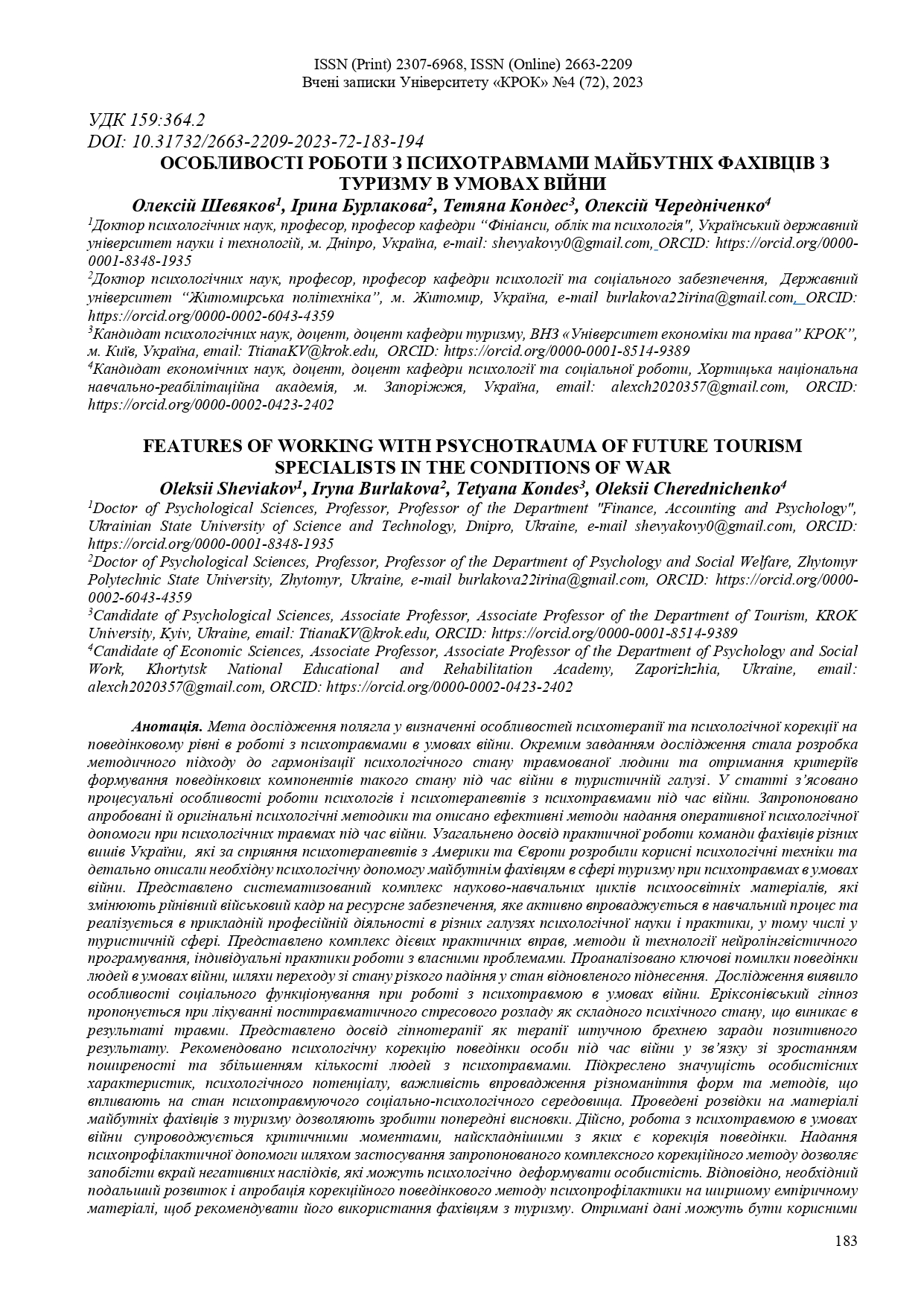FEATURES OF WORKING WITH PSYCHOTRAUMA OF FUTURE TOURISM SPECIALISTS IN THE CONDITIONS OF WAR
DOI:
https://doi.org/10.31732/2663-2209-2023-72-183-194Keywords:
war, peace, victory, psychotherapy, psychoeducation, faith, willpower, method of neurolinguistic programming, psychotrauma, psychological help, educational processAbstract
The purpose of the study was to determine the characteristics of psychotherapy and psychological correction at the behavioral level in working with psychotraumas in war conditions. A separate task of the research was the development of a methodical approach to the harmonization of the psychological state of a traumatized person and obtaining criteria for the formation of behavioral components of such a state during the war in the tourism industry. The article clarifies the procedural features of the work of psychologists and psychotherapists with psychotraumas during the war. Proven and original psychological methods are proposed and effective methods of providing operational psychological assistance for psychological injuries during the war are described. The experience of the practical work of a team of specialists from different universities of Ukraine, who, with the assistance of psychotherapists from America and Europe, developed useful psychological techniques and described in detail the necessary psychological help for future specialists in the field of tourism in the event of psychological trauma in war conditions is summarized. A systematized complex of scientific and educational cycles of psycho-educational materials is presented, which change the rank and file of military personnel into resource provision, which is actively implemented in the educational process and implemented in applied professional activities in various fields of psychological science and practice, including in the tourism sphere. A complex of effective practical exercises, methods and technologies of neurolinguistic programming, individual practices of working with one's own problems are presented. The key mistakes of people's behavior in the conditions of war, the ways of transition from a state of sharp decline to a state of restored elevation are analyzed. The study revealed the peculiarities of social functioning when working with psychotrauma in the conditions of war. Eriksonian hypnosis is offered in the treatment of post-traumatic stress disorder as a complex mental condition arising as a result of trauma. The experience of hypnotherapy as a therapy with artificial lies for the sake of a positive result is presented. Psychological correction of a person's behavior during the war is recommended due to the increasing prevalence and increase in the number of people with psychological trauma. The importance of personal characteristics, psychological potential, the importance of implementing a variety of forms and methods affecting the state of a psychotraumatic social and psychological environment is emphasized. Conducted research on the material of future tourism specialists allows us to draw preliminary conclusions. Indeed, work with psychotrauma in the conditions of war is accompanied by critical moments, the most difficult of which is behavior correction. Providing psycho-prophylactic help by applying the proposed complex correction method allows to prevent extremely negative consequences that can psychologically deform the personality. Accordingly, further development and approval of the corrective behavioral method of psychoprophylaxis on a wider range of empirical material is necessary to recommend its use to tourism professionals. The obtained data can be useful in determining the directions of work with psychotraumas during the war and in the future should be considered as objects of psychological support in the creation of differentiated programs of psychorehabilitation of future specialists in the field of tourism.
Downloads
References
Khomulenko, T., Fomenko, K., Rochniak A., Kuznetsov, O., Kostikova I.,& Diomidova N. (2019). Psychological And Biological Issues In Physical Activity. Sport Self-Regulation as a Motivational Source. 10 (2), 291-300.
Khomulenko, T., & Kuznetsov, O. (2019). Psycholinguistic Meaning of the Concept of "Faith". Psycholinguistics, 25(1), 338-362. Retrived from: https://doaj.org/article/78187162bf2c47e1b9a1ffe66e28aa30 . DOI: http://doi.org/10.31470/2309-1797-2019-25-1-338-362.
Kuznetsov, O., Khomulenko, T., & Fomenko, K. (2018). Prayer as a subject of speech activity and its communicative intention. Psycholinguistics. 2018. 23(1), 309-326. Retrived from http://doi.org/10.5281/zenodo.1211565.
Shevchenko, O., Burlakova, I., Sheviakov, O., Agarkov, O., & Shramko, I. (2020). Psychological foundations of occupational health of specialists of economic sphere. Медичні перспективи. 25 (2), 163-167.
Shevchenko, H., Antonenko, T., Bezuhla, M., & Safonova, I. (2020). Students’ Spiritual Security Education. Journal of History Culture and Art Research. 9 (4), 98-110. Retrived from: http://193.140.9.50/index.php/ilk/article/view/2799
Sheviakov, O., Burlakova, I., Kornienko, V., Vakukik, V., Slavska, Ya., Ostapenko, I., & Gerasimchuk, O. (2022). Psychoprophylaxis of the professional training crisis. Phylosophy, Economics and Law Review. 2 (1), 7-15.
Sheviakov, O., & Gerasimchuk, O. (2023). Psychological aspects of formation of professional health safety of specialists System. In International security studios managerial, economic, technical, legal, environmental, informative and psychological aspects. Inernational collective monograph. 60 (pp. 1133-1147). International Educations and scientifists Foundation.
Zhyhailo, N., Sheviakov, O., Burlakova, I., Slavska, Ya., Ostapenko, I., & Gerasimchuk, O. (2022). Psychoprophylaxis of the professional training crisis. Scientific Bulletin of Dnipropetrovsk State University of Internal Affairs. 1, 317-324.
Zhyhailo, N., Sheviakov, O., Burlakova, I., Slavska, Ya., Ostapenko, I., & Gerasimchuk, O. (2023). System of psychological support for the development of rehabilitation potential of power structures specialists. Public administration and Law Review. 1(13), 62-76.
Jakobson, S., & Smit, М. (2021). Cognitive Behavioral Therapy for Anxiety Disorders: A Comprehensive Review. Journal of Anxiety Disorders. 15(4), 567-582. DOI: 10.1016/j. janxdis.2021.07.001. https://pubmed.ncbi.nlm.nih.gov/36951322/
Prohaska, К. (2015). Mindfulness-Based Stress Reduction for Enhancing Psychological Well-being: A Meta-Analysis of Randomized Controlled Trials. Journal of Clinical Psychology. 71(4), 404-415. DOI: 10.1002/jclp.22183.
Hilligan, S. (2022). Generative Trance: The Experience of Creative Flow" (Crown House Publishing, 2022) https://t1p.de/j6h3o.
Blynova, O., Holovkova, L., & Sheviakov, O. (2018). Philosophical and sociocultural dimensions of personality psychоlogical security. Anthropological Measurements of Philosophical Research. 14, pp.73-83. doi: 10.15802/ampr.v0i14.150750.
Shevchenko, O., Burlakova, I., Sheviakov, O., Agarkov O., & Shramko, I. (2020). Psychological foundations of occupational health of specialists of economic sphere. Medical perspectives.25 (2),163-167.

Downloads
Published
How to Cite
Issue
Section
License

This work is licensed under a Creative Commons Attribution-NonCommercial 4.0 International License.

